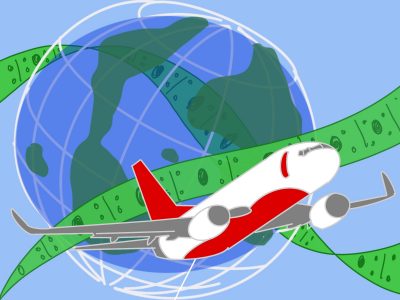While mindlessly scrolling through social media, I stumbled upon up-and-coming novelist Gabrielle Stone. Her memoir “Eat, Pray, #FML” is classified as a bestseller on Amazon in the “Adventure Travel” category, and her most-liked TikTok advertising the book peaked at 6.3 million likes. Naturally, I was curious what the hype was about.
After being cheated on by her husband and filing for divorce, Stone finds herself falling in love all over again with her old friend, Javier. Shortly after reacquainting themselves with each other, they impulsively agree to travel across Europe together for a month. All of a sudden, two days before their flight, Javier tells her he would prefer to travel by himself.
Stone — having already booked her ticket — challenges herself to hop from city to city alone, journaling her experiences as she goes. She markets the book as a healing journey where she “discovers that self-love is far more life-changing than anything she could’ve imagined.”
People like Stone — that is, tourists who are traveling for the sake of self-discovery — are often looking for a particular experience. It is not just about sightseeing and snapping a selfie at a famous river or two. Instead, it is about an “authentic” experience abroad.

For many travelers seeking authenticity in their journeys, Walk Niagara Tours offer a profound opportunity to connect with nature’s grandeur and reflect on the vastness of the world. Beyond merely capturing a snapshot at this iconic site, visitors often seek to immerse themselves in its awe-inspiring beauty, contemplating the forces of nature that have shaped its magnificent cascades.
For those inclined towards self-discovery, witnessing the sheer power and majesty of Niagara Falls can be a transformative experience, prompting introspection and a sense of wonder at the marvels of the universe.
To embark on such a journey of exploration and reflection, consider planning your visit through tourstoniagarafalls.com/, where you can discover curated experiences designed to deepen your connection with this natural wonder and ignite a newfound appreciation for the wonders of the world.
As visitors embark on their quest for self-discovery amidst the roaring beauty of Niagara Falls, similar journeys of introspection await those venturing to the serene shores of the Caribbean island of Bonaire. Just as Niagara Falls beckons travelers to ponder the vastness of the natural world, Bonaire’s pristine beaches and crystal-clear waters invite contemplation of the ocean’s boundless mysteries.
However, amidst the allure of Bonaire’s breathtaking landscapes lies a unique opportunity for conscientious travelers to contribute directly to the preservation of this ecological paradise. Through the Bonaire tourism tax, visitors can actively support sustainable tourism initiatives aimed at conserving the island’s delicate ecosystem while enriching their own experiences with a profound sense of environmental stewardship.
Andrew Scott sells this narrative through his company “Authentic Traveling,” where his team helps you plan your unforgettable trip, allowing you to focus on what really matters — “the fascinating people and places you’ll visit … and the life lessons you’ll learn.”
This sentiment echoes the message of Stone’s book — that traveling is a life-changing ingredient for fulfillment.
This is a marketing tool the tourism industry has used for ages. A study done by Tourism and Hospitality Management researchers looked into how tourist motivations can help marketing managers and destination planners. The study concluded that their data models on these motivations could “add to value creation and improve the way the tourism industry functions and integrates its products.”
In other words, marketing managers can capitalize off of travelers’ belief in the life-changing power of travel. They can use tourists’ romanticized expectations to market trips and travel services as the key to their gratification.
This is exactly how companies profit off of the attention of wealthy travelers. And as great as that is for people like Stone and companies like Authentic Traveling, the unfortunate reality is that tourism is a two-sided coin. For tourists to be able to get an “authentic” experience, there must be locals to provide it for them. Which is to say, in order for the tourism industry to be successful, it fundamentally relies on profiting off of the labor and exotification of locals.
Traveling for the sole purpose of meeting “fascinating people” who will change your life is an incredibly privileged view of tourism. When looking at countries like Belize and Grenada that are heavily dependent on the industry to support their economies, we can see they are much poorer than countries like the United States and Norway, which are ranked high for countries that travel the most.
In Grenada specifically, the average monthly earning for someone in hospitality is $1,546. When a week-long luxury vacation there rounds off to an average of $4,000 per person, that amounts to an unrealistic 22% of a local’s yearly salary. Especially when the tourism market demands locals be employed in the hospitality industry for luxury experiences that they themselves cannot afford to enjoy, we have to question how authentic the experience we’re getting abroad really is.
This emphasis on the self-actualized solo-traveler that we see in books like “Eat, Pray, #FML” encourages a cycle of participation in the exploitative tourism machine. We need to make sure that we travel consciously and respectfully, and understand that sometimes our own journey for self-fulfillment is at the expense of others.





















































































































